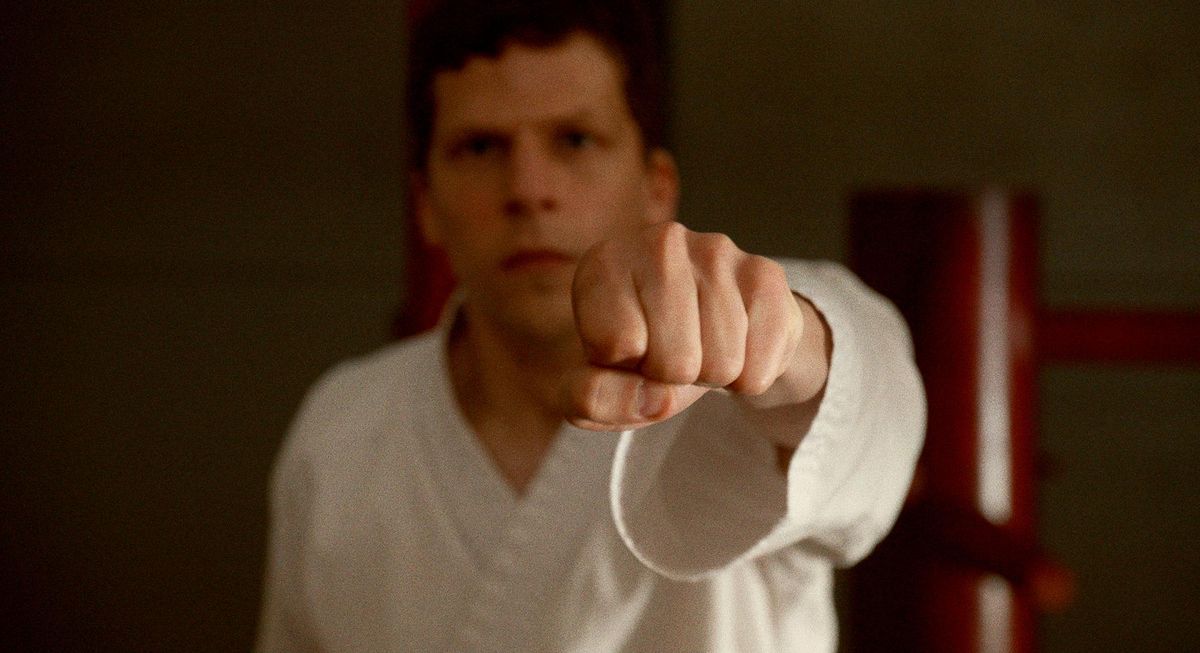Review: ‘The Art of Self-Defense’ is a sour, fitfully funny comedy about toxic masculinity

There’s sometimes a fine line between satirizing a shortcoming and suffering from it. “The Art of Self-Defense,” a black comedy about a milquetoast accountant (Jesse Eisenberg) who, after a mugging, signs up for karate lessons from a charismatic, hyper-macho nut-job (Alessandro Nivola), is meant to hold up its portrayal of toxic masculinity to ridicule. But at times, the movie struggles to maintain the critical balance between detachment from and engagement with the thing it’s making fun of.
Is “Self-Defense” an excoriation of testosterone poisoning or a victim of it?
Part of the problem in answering that question is the unspecified period in which the film is set, which is hinted at by the absence of cellphones and high-speed internet, and the presence of landlines, answering machines and putty-colored, boxlike computers. Is writer-director Riley Stearns suggesting that there’s something equally obsolete about Nivola’s Sensei, who quickly takes Eisenberg’s Casey under his wing, before inculcating him in a regimen of cartoonish – and, gradually, terrifyingly violent – male posturing?
That seems likely, given how out of place a character like Sensei seems in 2019: Belittling women and weaker men, he’s the kind of bully we still read about every day in the news, but viewed through the uncritical (even, at times, flattering) filter of a period piece.
Ha-ha, the movie seems to say: Look how stupid men were 30 years ago. (What do you mean, #MeToo? We’re not like that now.)
Another oddity about the film is its un-naturalistic style. Every character, including Anna (Imogen Poots), the dojo’s one female student-teacher, speaks like a robot. No one is recognizably human, let alone three-dimensional. Where is the outrage among parents when they witness Anna telling their children in one of her classes about killing an opponent? Where is the pushback against Sensei when he tells Casey that his name is “very feminine-sounding”?
That, of course, comes later, when we find out that his own name is Leslie. Make no mistake: I’m not saying this isn’t a funny movie, here and there. But Sensei’s worst predilections are, for the most part, met without a single raised eyebrow.
Those predilections include a long list of crazy behavior, including public humiliation, unprovoked assault and worse. And Casey proves himself to be a willing, even fanatical, student, accepting Sensei’s indoctrination in the cult of caricatured manliness to an absurd, hard-to-swallow degree.
Casey eventually gets so deep into the dojo’s bro-culture that he loses his job (along with his mind, apparently). There is not a single raised eyebrow when the film presents an act of shockingly graphic brutality – one that seems out of keeping with what is ostensibly a comedy.
There may, however, be plenty of eye-rolling. As “The Art of Self-Defense” approaches its cockamamie crescendo, it forsakes true insight about the roots of male aggression for what feels like a helpless shrug of defeat: Toxic masculinity isn’t just contagious, the film suggests, but – what can you do? – unavoidable.